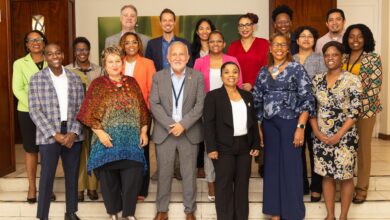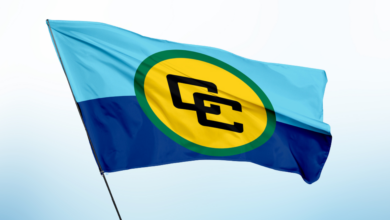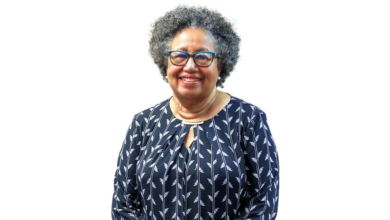The Governments and people of Caribbean Community (CARICOM) Member States continue to actively support their sister country Dominica following Monday night’s devastating passage of Category 5 Hurricane Maria.
“We’ve lost all that money can buy”, Prime Minister Roosevelt had disclosed after surveying the widespread damage to houses and infrastructure. A number of deaths have also been reported.
The government of close neighbour Antigua and Barbuda, while still itself in recovery mode from another Category Five Hurricane, Irma’s destructive passage over Barbuda, made an immediate pledge of US$300,000, to which Tourism Minister Asot Michael added a further US$100,000. Antigua-Barbuda’s state and private broadcast media, in particular ABS Radio and TV have been providing a critical connection between Dominica’s residents and the rest of the world, especially during the period when all broadcast and internet services were down. ABS TV provided the first broadcast by Prime Minister Roosevelt Skerrit to the world after his initial aerial tour of the devastation.
Barbados was also quick out the blocks, putting two coast guard vessels at Dominica’s disposal to help transport technical personnel and supplies. The vessels left Bridgetown loaded with water and other emergency supplies donated by Barbadians in heavily supported collection drives. Barbados has also arranged to provide much needed doctors and nurses to assist with critical medical services.
With rural communities cut off by damaged or blocked roadways, Trinidad and Tobago’s helicopter service proved critical for transporting emergency personnel and assessment teams to the remote villages for damage assessment, to extract the injured and stranded, and to deliver emergency supplies. Trinidad and Tobago had previously provided its helicopter to the Antigua and Barbuda government to assist with emergency services between Antigua and sister-island Barbuda which lost more than 90 percent of its houses to Hurricane Irma and which, as a result, had to be totally evacuated. The Trinidad and Tobago government also announced that it will waive the immigration requirements for residents of Dominica for a period of six months as the CARICOM Member State rebuilds.
The Dominica Government welcomed contingents of police officers from Trinidad and Tobago, Barbados, Grenada, Saint Lucia and Jamaica among others to assist with security during this recovery period. Grenada announced that a detachment from its Special Services Unit has joined an earlier team of communication and logistics officers supporting the CARICOM Disaster Relief Unit (CDRU). Jamaica made available 120 members of its Defence Force Disaster Response Team to help with maintaining public order, engineering, relief distribution and damage assessment. Saint Lucia’s police contingent was joined by fire and rescue officers as well as disaster assessment officials from the country’s National Emergency Management Organization (NEMO).
The Saint Lucia Government also activated Bank accounts at major banks to collect public contributions. Grenada’s NADMA (National Disaster Management Agency) also shipped a large donation from Grenadians, including tarpaulins, water, food and other emergency supplies.
#RegionalResponse teams deployed to Dominica #RNAT #CDAC #SAR #CDRU pic.twitter.com/QyBvbgNjNl
— CDEMA (@cdemacu) September 23, 2017
The Guyana Government donated the sum of US$100,000 to the Caribbean Emergency Disaster Management Agency (CEDEMA, the lead CARICOM Institution coordinating the Region’s response to the devastation caused by Maria, and before her, Irma and Harvey. The Government also announced the shipment of food and medical and sanitary supplies via a British C-130 military plane and a further ten containers filled with building materials for the hurricane affected islands. Two bank accounts were activated to receive public donations and the State-owned TV and Radio stations were staging a telethon on Saturday to raise further support from the Guyanese public.
St. Vincent and the Grenadines used a visiting Venezuelan military aircraft to airlift its contribution of emergency supplies to Dominica. The country’s radio stations were scheduled to have a joint radiothon on Sunday to mobilise public contributions.
CEDEMA continued its coordination though deployment of regional response teams including the Rapid Needs Assessment Team (RNAT), the CARICOM Disaster and Assessment and Coordination (CDAC) Team, Search and Rescue (SAR), and the CARICOM Disaster Relief Unit (CDRU). A Team from the Caribbean Public Health Agency (CARPHA’) also added its expertise to the water, sanitation and hygiene component of CDEMA’s evaluation, and is helping to assess Dominica’s health facilities and water infrastructure. CDEMA’s Executive Director Ronald Jackson, and the Secretary-General of the Caribbean Community (CARICOM) Ambassador Irwin LaRocque have conducted first hand assessments of the damage and are providing on-location coordination. Executive Director of the Regional Security System RSS, Captain Errington Shurland is also leading his organisations work on the ground in Dominica.
CARICOM Member States used their statements to this week’s 72nd session of the United Nations General Assembly to draw attention to the need for international support for the recovery effort in Dominica and other affected islands and to reiterate their position that serious and urgent global attention must be paid to the issues surrounding climate change.
Prime Minister Skerrit of Dominica told the world body:
“The time has come for the international community to make a stand and to decide; whether it will be shoulder to shoulder with those suffering the ravages of climate change worldwide; Whether we can mitigate the consequences of unprecedented increases in sea temperatures and levels; whether to help us rebuild sustainable livelihoods; or whether the international community will merely show some pity now, and then flee….; relieved to know that this time it was not you.”






